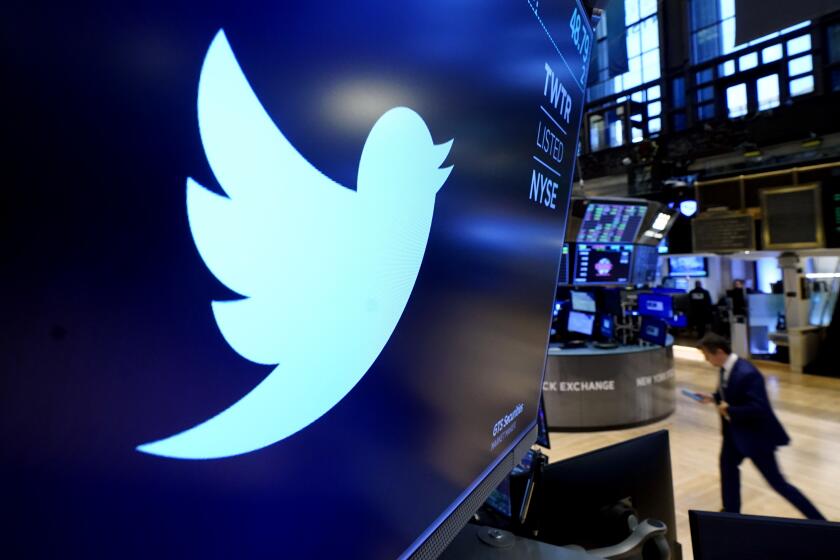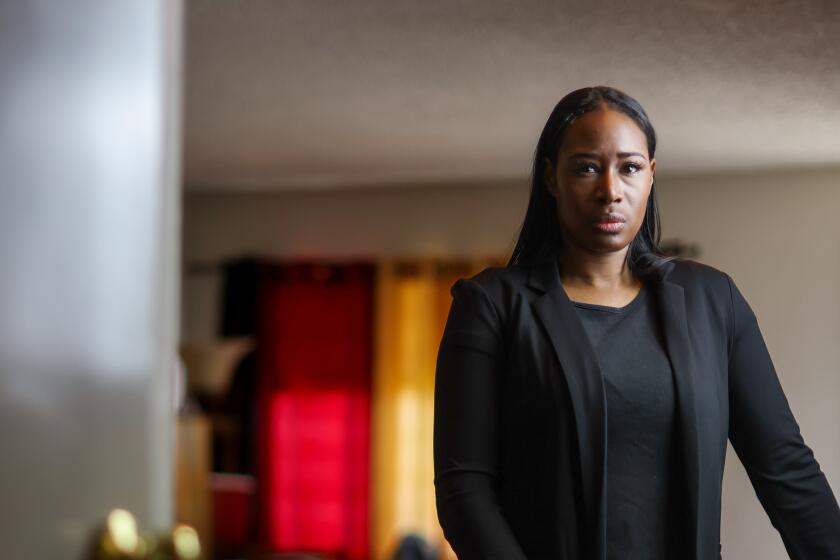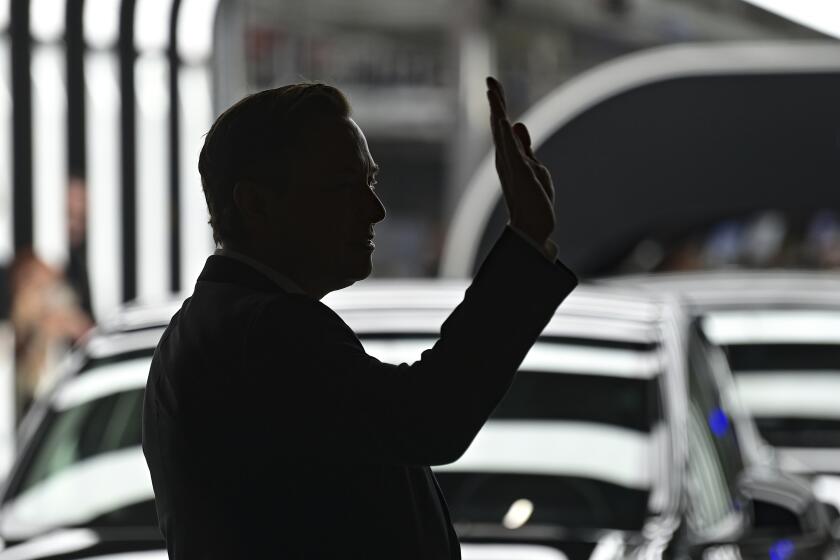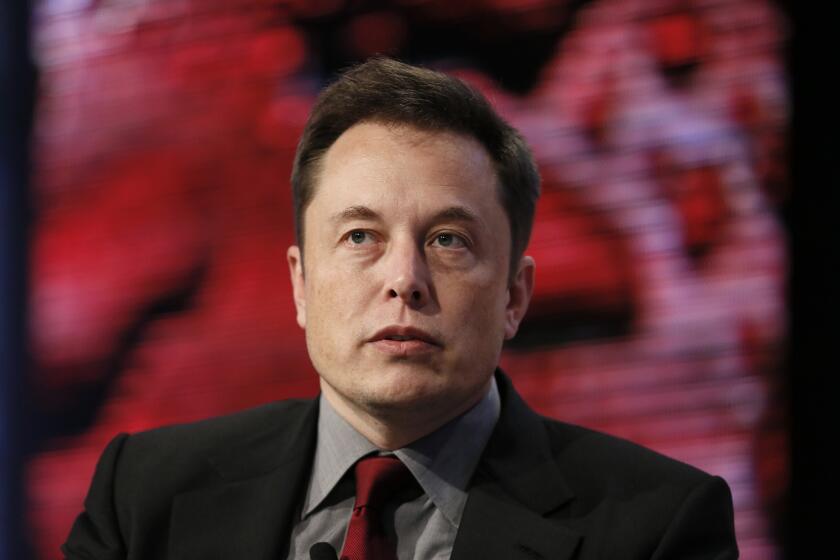Elon Musk reaches $44-billion deal to buy Twitter

The social media company approved the billionaire and avid Twitter user’s $44-billion bid after weeks of back and forth
- Share via
Elon Musk’s bid to buy Twitter and take the company private succeeded Monday, 11 days after the world’s wealthiest man first announced that he’d like to buy the social media company.
“Free speech is the bedrock of a functioning democracy, and Twitter is the digital town square where matters vital to the future of humanity are debated,” Musk said in a statement announcing the board’s approval of the $44-billion deal. “I also want to make Twitter better than ever by enhancing the product with new features, making the algorithms open source to increase trust, defeating the spam bots, and authenticating all humans.”
Here’s how Elon Musk’s deal to buy Twitter works and what it could mean for shareholders.
The company’s leadership initially tried to fend off the bid, adopting a “poison pill” measure that would make a hostile takeover difficult.
But Musk announced that he had $46.5 billion in financing lined up in filings with the Securities and Exchange Commission on Thursday, prompting Twitter’s board to meet Sunday to discuss the bid. After that meeting, the board opened negotiations with Musk that stretched late into the night, according to reporting by the New York Times.
The deal values Twitter stock at about $54 a share, above the $39 that the stock was trading at before Musk’s interest in the company became clear in early April, when he purchased a 9% stake in the company, but also well below the stock’s 2021 high of $77 a share. After the news of the deal went out, Twitter shares rose 5.7% to $51.70 by the end of Monday’s trading.
In a virtual all-hands meeting Monday afternoon, Twitter Chief Executive Parag Agrawal said that layoffs are not planned “at this time.”
In response to an employee question about reinstating the Twitter account of former President Trump, Reuters reported that Agrawal said, “Once the deal closes, we don’t know which direction the platform will go.”
Musk stated that his interest in Twitter is motivated not by the company’s finances but by its role as a public forum and his belief that he could manage the platform better than its current leadership.
In their own words, former Tesla employees describe what they call a racist work environment that led California to file a civil rights lawsuit against the company.
But Musk has indicated he will tilt Twitter’s content moderation in a permissive direction, writing in his SEC filing, “I invested in Twitter as I believe in its potential to be the platform for free speech around the globe, and I believe free speech is a societal imperative for a functioning democracy.”
Since its launch in 2006, Twitter has become one of the core companies of the social media age — but it has had a difficult time becoming a profitable business and has been a site of explosive disagreement over the moderation of online speech.
Founded by Jack Dorsey, Evan Williams, Noah Glass and Biz Stone as a site that allowed users to post 140-character messages using SMS texting, Twitter experienced its first surge of interest after a presentation at the 2007 SXSW festival in Texas.
The next few years brought explosive growth. In 2011, the company announced it had 100 million monthly active users. By the time Twitter went public, in 2013, that number had doubled to more than 200 million people.
But Twitter could not sustain that rate of expansion. While Facebook, Instagram and upstart platform TikTok each rocketed past Twitter to more than 1 billion users in the last decade, Twitter hit a plateau. The company counted 300 million monthly users in 2019 before switching its reported metrics. Now it has 217 million monetizable daily active users, according to its latest corporate filings.
Under a series of chief executives, Twitter did figure out how to squeeze more money out of those users. Revenue grew from $1.4 billion in 2014 to more than $5 billion in 2021. But the company booked a profit only in 2018 and 2019 and returned to losing money the last two years.
Research firm MoffettNathanson wrote that Musk’s offer was “a steal of a deal for shareholders given the operating, monetization and valuation challenges at the company,” but the authors cautioned that they “expect advertisers will be less willing to spend on Twitter if Elon Musk removes content moderation in order to promote free speech.”
Even as its user growth stagnated, however, Twitter became the go-to platform for journalists and politicians, a volatile combination that has turned it into one of the key battlegrounds in the fight over online harassment, the limits of public speech and the power of tech companies.
Nowhere was the battle hotter than in the debate around banning Trump from the platform. Over the course of his presidency, Trump used Twitter daily to opine about current events, announce U.S. policy changes and interact with his 88 million followers.
How seriously should we take Elon Musk’s rhetoric about bringing free speech and transparency to Twitter? Rather than parse his words, let’s look at his past actions.
Often, the president’s tweets were untrue, and after the 2020 presidential election, he frequently tweeted the unfounded conspiracy theory that he was the rightful winner of that election, which he claimed was somehow manipulated to make him lose. After the Jan. 6 attempt to overthrow the U.S. government, Twitter shut down the sitting president’s account and permanently suspended him from the service.
Musk’s bid for the company and rhetoric around free speech have fueled speculation that he would reinstate Trump’s account. Musk has not commented directly on the possibility. Trump said in an April interview that he “probably wouldn’t have any interest” in returning to Twitter, which he said has “become very boring.”
Musk, whose list of startups includes the company that eventually became PayPal as well as Tesla and SpaceX, has never been banned, but he has faced his own Twitter muzzle, one imposed by the SEC after he said in an August 2018 tweet that he had “funding secured” for a bid to take publicly traded Tesla private at $420 a share.
Already sanctioned by the SEC on a fraud charge, Elon Musk and Tesla fight a civil suit on his buyout claim.
Musk had never secured any funding for the deal. The tweet led to fraud charges against him by the SEC. In a settlement, Musk agreed to a $20-million fine and removal as Tesla chairman for three years. The SEC also required him to designate a company officer to review his tweets for possible violations of securities law, a position that came to be known as Musk’s “Twitter sitter.”
Musk continued tweeting information about Tesla stock, future financial performance, upcoming products and other information that could be construed as the kind of “material information” the SEC had sought to put a brake on. The timing of his replies to followers suggested no review was being conducted.
After Joe Biden became president, the SEC began issuing subpoenas to Musk on the “funding secured” matter and hinted that it was investigating other matters related to Musk.
Recently, Musk has said that he was pressured into signing the SEC settlement and did so only because Tesla was on the verge of bankruptcy at the time and that fighting the government on fraud charges could have cut off access to financing and sunk the company.
With no overlap with his other businesses, Musk’s acquisition of Twitter isn’t expected to receive antitrust scrutiny, but some observers — including Amazon Chairman Jeff Bezos, Musk’s rival in the private space industry — have raised the prospect that Musk’s business interests in China, an important supplier and market for Tesla, could create a conflict with his ownership of a social media platform.
“Twitter currently is among platforms which provide some avenues for advocacy for Chinese dissidents, and so there would be a serious human rights cost if they lost it as a way of communicating with each other and the rest of the world,” said David Greene, civil liberties director at the Electronic Frontier Foundation.
“Did the Chinese government just gain some leverage over the town square?” Bezos tweeted.
More to Read
Inside the business of entertainment
The Wide Shot brings you news, analysis and insights on everything from streaming wars to production — and what it all means for the future.
You may occasionally receive promotional content from the Los Angeles Times.
















